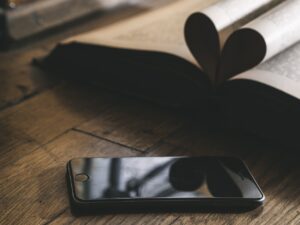
When I was sixteen, I was obsessed with art and music. I used to spend my days drawing and smoking weed with my classmates, and it was heaven.
For most people, high school was a nightmare; for me, it’s been one of the best times ever. You can tell how happy I was by the fact that I kept falling in love—with art, school, and people. It was so easy that for a long time I didn’t understand what that sensation of being constantly ecstatic and slightly breathless was. It finally struck me when I realized that I had fallen for a friend of mine.
High school was such a welcoming environment; it’s one of the reasons why it was so easy for me to accept that I wasn’t straight. Being surrounded by people who are unapologetically themselves has the tendency to encourage you to do the same, after all. It felt like a revelation.
I was sitting by myself during an Italian literature class and my thoughts, lulled by my professor’s voice, started wandering. As I listened to him discuss the Divine Comedy, for some reason I ended up thinking about my friend B, and how she had cut ties with me out of the blue a few weeks earlier. If someone has ever disappeared from your life like that, you will understand the ferocious pain I was experiencing. It was worse than an actual breakup, because there was no closure to the relationship. One moment you have it all; the next, everything about that person has been eradicated from your life, and there’s nothing you can do about it. You’re left feeling guilty, furious, and heartbroken.
After going through the first stage of denial, I resigned myself to it. I ceased my poor attempts at to reach B, hoping I’d forget about her and everything our friendship had meant to me. Months passed, but the emptiness she’d left in my chest never got filled. It only became bigger and darker, consuming me from the inside. It didn’t matter that I had stopped looking for her. Suddenly, she was everywhere: in the music store downtown, playing the punk-rock albums we used to listen to together; in the Blue Lucky Strikes I used to smoke, which was her go-to brand as well.
We shared so much—cigarettes, secrets, time—that it was now painfully easy to run into traces of her everywhere I turned. Some, I easily recognized (that one song by Green Day she once dedicated to me; her handwriting in my planner; my smartphone background—a picture of us together), but the most painful ones came unannounced, like unexpected visitors.
That’s how, one day in class, I found myself thinking about her. Tired of feeling desperate and confused, I decided to analyze my feelings once and for all. I proceeded to ask myself a series of questions and to answer them one by one.
The first question was: have I ever felt this pain before? The answer was: no, never.
Which led to my next question: would I feel like this if some other friend of mine left me? It would be painful, but it wouldn’t be this same suffering that’s been choking me for weeks now. The next question came easily: Why is that so? Because, I thought with the kind of euphoria that overtakes you when you realize something major about yourself: “I have a crush on my friend. On a girl.”
Up to that point, I had never had a crush, which was why it took me so long to recognize it for what it was. After putting a name to it, everything slotted into place at once—all the tears I had shed, the way my hands turned sweaty when I was about to see her, how I thought she was the most beautiful girl I knew.
I replayed the memories of that one wonderful day we had spent together, sharing drinks in an overpriced café: the only thing I was able to focus on was how B’s freckles looked like drops of honey dotted along the bridge of her nose. I remember feeling seized by the need to caress her skin and lick my own fingertips, longing to taste the sweetness that would have been left there. I had to force myself to stay still. “This is how being in love feels like, then,” I thought.
Coming back to myself, and to The Divine Comedy, I noticed what my professor was talking about: Dante’s love for Beatrice. As his words filtered in my thoughts, I found myself thinking about Dante choosing Beatrice as his guide through Paradise, about calling her “la gloriosa donna de la mia mente.”
Suddenly, I could relate to all the love stories I had always dismissed as “too much.” I finally understood why Romeo decided to kill himself after losing Juliet, and why Juliet gave up her own life in turn. I understood why Orlando lost his sense when he found out Angelica married someone else. Yes, I was a pretty dramatic teenager. But that’s how your first love feels: life-changing and earth-shattering.
After that, relief washed over me. I finally had an answer: I liked girls. I loved the sound of it. It felt like something special, something to be proud of, like being accepted into a cool club. I wanted everyone to know. It took me a long time to realize that my reaction to finding out I was queer wasn’t necessarily as common as I thought. I took it for granted for years, thinking it was easy to accept that aspect of yourself; after all, being queer doesn’t change who you are. Yes, I was also a pretty naïve teenager.
I have to thank the environment at school for my prompt reaction. If I had spent those same years in a different place, perhaps that moment of realization would have never arrived. Perhaps it would have come only years later. Luckily, I was blessed with having friends who accepted my revelation for what it was: just another piece of information about myself. I was the tall girl who sucked at sports, favored Dr. Marten boots, and now also liked boys and girls. Nothing changed between us; we kept making art and getting high, just like any other day.
I never got up the courage to confess my feelings to B, but, as I mentioned, my revelation shocked no one. I’m sure she knew even before I began to understand it myself, which was why she disappeared. But this is a story for another time.
 Susan Olmi (she/her) is a 28 years old queer Italian illustrator, art historian and writer based in Haarlem, Netherlands. With a bachelor in Conservation of Cultural Assets and a MA in History and Criticism of Art, she is deeply passionate about everything art related. Her illustrations have been featured in various zines and fan zines.
Susan Olmi (she/her) is a 28 years old queer Italian illustrator, art historian and writer based in Haarlem, Netherlands. With a bachelor in Conservation of Cultural Assets and a MA in History and Criticism of Art, she is deeply passionate about everything art related. Her illustrations have been featured in various zines and fan zines.






